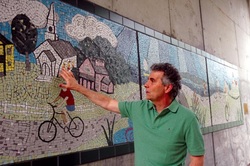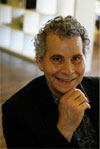 All the Little Pieces Mosaic artist Jim Bowen’s skills for creating works of this ancient art require an understanding of how each part makes the universe whole. Jim Bowen introduced an interesting art analogy to local elementary school students , with whom he is constructing a large mosaic tree that will be presented to the principal, an art teacher himself, as a retirement present. Each student will fashion a leaf for the tree and embellish it with some sort of personal token. He first asked the students not if they knew what a mosaic was, but what the word community meant to them. Tiny hands darted up. Their answers were what you might expect from first graders—slightly correct in concept, but humorously misconstrued. “A community is made up of all different people,” he explained. “Each are of different colors, shapes, and sizes, and each have different stories and backgrounds. When all of the individuals come together as a whole to share their differences, a community is formed. It’s the same with mosaics.” Even after fourteen years of practicing this 3,000-year-old art, (the first mosaics were said to be in the form of bullet-shaped clay attached to the columns of a building in ancient Iran), Bowen’s career as a mosaic artist and teacher is just at its beginning. “I’ve done painting, print-making, pencil, oil and even some pottery, but I have never felt like I found the right medium for me,” says Bowen. After one day in the late nineties, when he started piecing together bits of china onto furniture (a new artistic fad at the time, one that his wife saw at a local workshop), making mosaics became his newfound joy. “I liked the messiness of it. Here you are, breaking up china and making something beautiful again,” he says. “It’s like a broken person who becomes healed.” In Haiti, it healed an entire community. After the devastating earthquake in 2010, fellow mosaic artist Laurel True from New Orleans went down to help raise spirits through artwork. Gathering up locals, many who had lost family members and every possession ever owned, True helped the people make beautiful mosaic leaves out of broken household remains like dishes, glassware, and mirrors. Bowen, inspired by her efforts, is planning a trip to Malawi in Africa in the next year or two to lead a mosaic mural project at a school that is being built by a Massachusetts couple. After taking his first mosaic class at Truro Center for the Arts at Castle Hill in 1998, Bowen discovered a natural teaching ability that he never knew he had. He went on to teach a class of his own at Castle Hill, then to students at Cape Cod Community College, where he began the mosaic program there and has been instructing a mosaic course off and on for the last decade. Drawn to stained glass, he teaches the students to cut it, grind it, mount it, grout it, and get invested in what they’re making. Bowen has led the creation of a half dozen large mosaic murals on-and off-Cape, such as the one seen at the newly opened Falmouth Dog Park and under a bridge along the Shining Sea Bikeway, also in Falmouth. During the weekend of the National Mosaic Exhibition at Highfield Hall last August, students helped Bowen, artist Linda Dadek, and illustrator Erica Szuplat (who designed the original image) create the mural. Depicted is the land’s strawberry fields in the background, while dogs and a boy are at play in the park. Back in 2010, the same three artists led a group of volunteers, both experienced and first-time mosaic makers, to put together the bikeway’s mural. Bowen guided the novices in their first go at a large-scale project. Cutting and placing together (one at a time) more than 20,000 tile pieces to make one show-stopping image is not easy work even for an experienced artist. Though the actual design is quite simplistic, each individual piece makes a statement and provides definition to the entirety of the work. In Bowen’s home studio is a mosaic of Jesus Christ, his eyes of glistening brown glass which look as if they have the power to communicate. “If you can capture emotion with just one tiny piece of glass or tile, it really just fascinates people,” says Bowen, who won “best in show” at the 2009 Falmouth Guild Fall Juried Show for his mosaic of a woman in Peru on her way to the market. This one now hangs in the Artisan Salon which he co-owns with another artist (he has been cutting hair for 35 years). Following last year’s National Mosaic Exhibition at Highfield Hall, which was co-curated by Bowen and featured workshops led by renowned mosaic artists, he and his wife began their own school called Cape Cod Mosaic Workshops at Highfield Hall, one of only three other mosaic schools in the nation (and the only one in New England). Each workshop is led by a visiting artist or resident artist including Bowen and cater to both novice and advanced students (another National Mosaic Exhibition is planned for 2013). His two children grown, his salon still thriving, and his teaching a re-emerging trade, there couldn’t be a better time for Bowen to dig his hands into another fun educational project—a children’s book, told through mosaics. Bowen isn’t always a realist with his work; he also enjoys creating abstract mosaics, ones that come together through imagination as the artwork is being assembled. But many of his most proud works are inspired by emotion and expression and often hold deeper meaning—just like the word “community.” Learn more about Jim Bowen and Cape Cod Mosaic Workshops atwww.capecodmosaicworkshops.com JACQUELYN MYSLIWIEC
0 Comments
Leave a Reply. |
Archives
April 2017
Categories
All
|

 RSS Feed
RSS Feed
